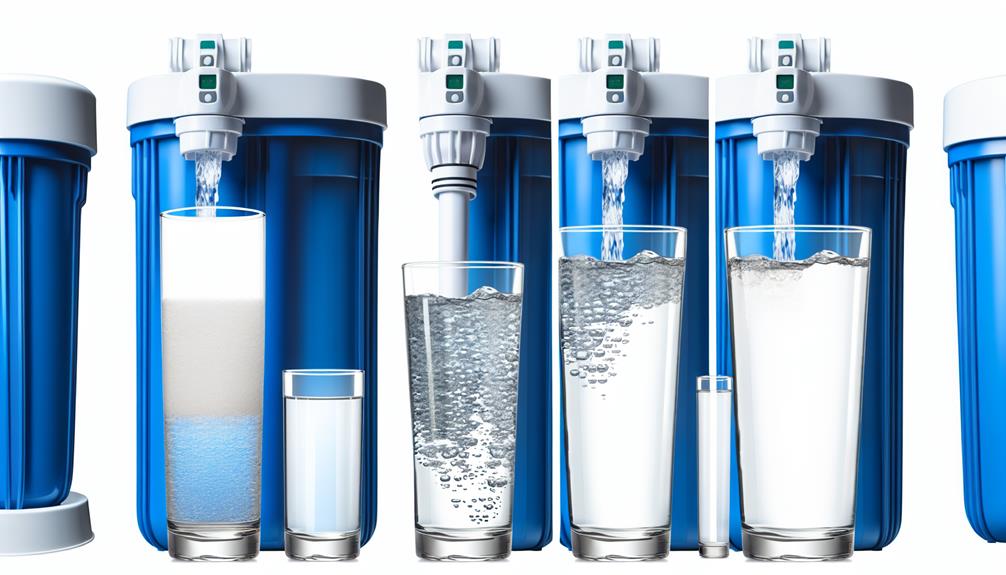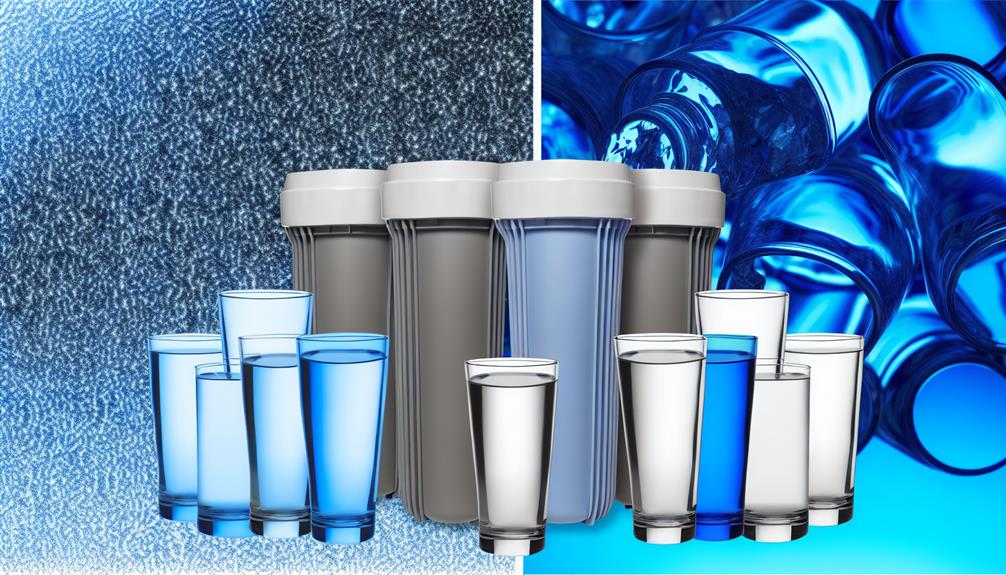Nearly 85% of homes in the United States grapple with hard water, an issue that can lead to a myriad of plumbing and appliance inefficiencies. You're likely among those dealing with the minerals that leave residue on your dishes and reduce the life expectancy of your water-using appliances.
It's essential to find an effective water filter to mitigate these effects, but with the market flooded with options, pinpointing the right one for your home can be a task riddled with technical jargon and conflicting reviews.
To guide you through your decision-making process, you'll need to consider factors such as the size of your household, the hardness of your water, and your budget.
Stay with me as we explore the leading solutions that promise to transform your hard water woes into a forgotten concern, and discover which technology fits your specific needs like a glove.
Understanding Hard Water Challenges
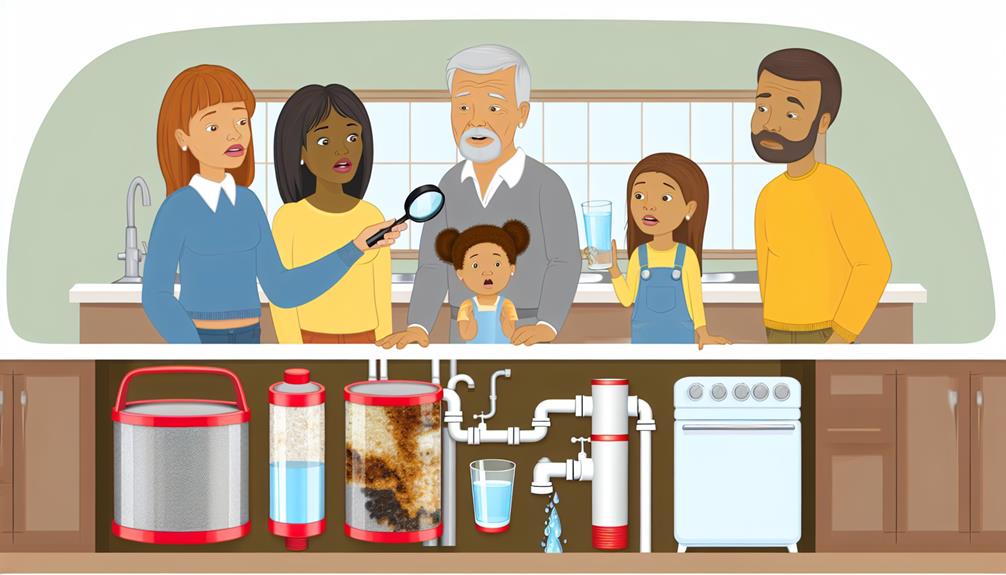
Hard water presents a myriad of challenges, affecting everything from your plumbing to the efficacy of your cleaning products. When you're dealing with hard water, you're facing high concentrations of minerals, such as calcium and magnesium, which can lead to scale buildup in pipes and appliances. This accumulation not only jeopardizes appliance efficiency but can also shorten the lifespan of your water-using equipment.
Scale buildup is particularly detrimental to appliances like water heaters, dishwashers, and washing machines. The efficiency loss translates to higher energy consumption as appliances work harder to perform their functions, leading to increased utility bills. Moreover, the scale acts as an insulating layer in heating elements, necessitating more energy to achieve the desired temperature.
Your understanding of these technical aspects is crucial in recognizing the importance of addressing hard water problems promptly. Scale buildup isn't merely a cosmetic issue—it's a performance and economic concern. As a homeowner, you must tackle the source of the problem: the hard water itself. The right water filter can mitigate these challenges by removing excess minerals, thereby preserving the efficiency of your appliances and ensuring the longevity of your plumbing infrastructure.
Salt-Based Softener Systems
To counteract the detrimental effects of mineral buildup, salt-based softener systems are a proven solution for homeowners seeking to eliminate hard water's impact on their household appliances and plumbing. These systems function through a process known as ion exchange, where calcium and magnesium ions—responsible for water hardness—are replaced with sodium ions.
Here's how they work:
- Ion Exchange Process: Hard water passes through a resin bed within the softener system. The resin beads have a negative charge, which attracts and holds onto the positively charged hard minerals.
- Resin Regeneration: Once the resin beads are saturated with hardness minerals, they must be regenerated. This is achieved by flushing the system with a brine solution, where the high concentration of sodium forces the hard minerals to release from the beads.
- Brine Tank Refill: After regeneration, the system automatically replenishes the brine tank with salt, preparing it for the next cycle.
- Continuous Soft Water Supply: Through automated cycles, the system ensures a consistent output of softened water, protecting your appliances and plumbing from scale buildup.
Selecting a salt-based softener system demands careful analysis of your water hardness level, household size, and regeneration features to ensure optimal performance and efficiency. Remember, regular maintenance, including salt replenishment and system checks, is crucial for sustained operation.
Salt-Free Water Conditioners
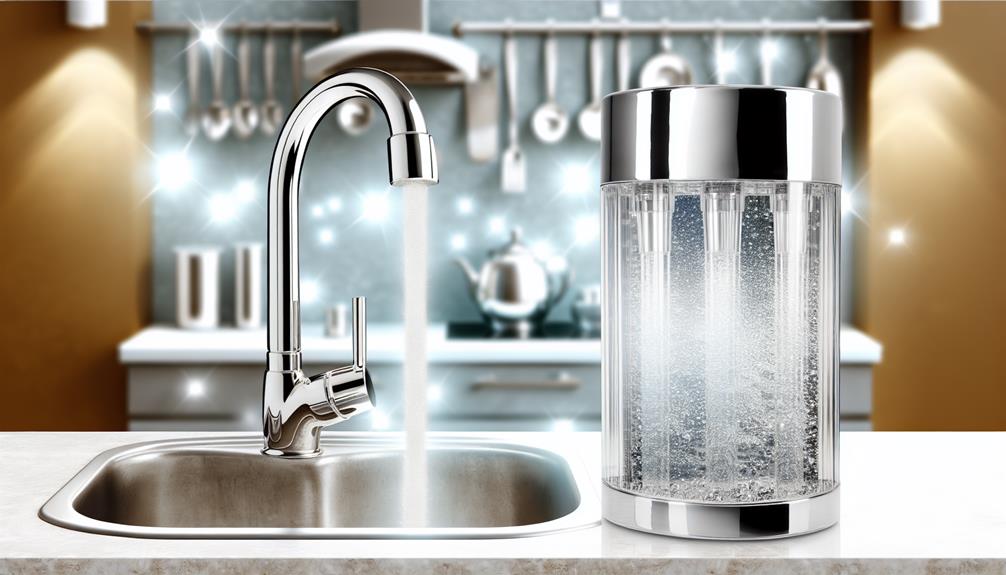
For homeowners seeking a maintenance-free alternative to traditional salt-based systems, salt-free water conditioners offer a viable solution for managing hard water without the need for salt or chemicals. These conditioners employ a process known as Template Assisted Crystallization (TAC), which alters the structure of minerals such as calcium and magnesium, the primary constituents of hard water. This transformation hinders the minerals from bonding and creating scale buildup in your plumbing and appliances.
Unlike softeners that replace hard minerals with sodium, salt-free conditioners preserve the mineral content, effectively preventing scale without a change in Total Dissolved Solids (TDS). This aspect is particularly beneficial for those who prefer not reducing the mineral content of their water for health or taste reasons.
When you're analyzing options for scale prevention, it's crucial to consider the efficiency of the conditioner in terms of flow rate and the volume of water it can effectively treat. High-quality salt-free conditioners are designed to handle substantial volumes without compromising water pressure, ensuring that your household water supply remains uninterrupted and fully operational.
It's important to note that while salt-free water conditioners are excellent for scale prevention, they don't provide TDS reduction. If your water quality concerns extend to high TDS levels, you may need to explore additional filtration methods in conjunction with a salt-free conditioner.
Reverse Osmosis Filters
Reverse osmosis filters provide a robust solution for homeowners seeking to significantly reduce TDS levels and eliminate a wide array of contaminants from their hard water. This technology pushes water through a semipermeable membrane, trapping unwanted particles and delivering clean, soft water to your tap.
Let's delve into the key aspects that make reverse osmosis filters an excellent choice for tackling hard water:
- Contaminant removal: They're capable of eliminating up to 99% of dissolved salts, particles, colloids, bacteria, and pyrogens. Unlike other filters, reverse osmosis can effectively remove fluoride and heavy metals.
- Filter maintenance: While they're highly effective, they do require regular maintenance. This includes periodic replacement of the pre-filters, post-filters, and the RO membrane itself to ensure peak performance.
- Water efficiency: Some reverse osmosis systems are engineered to be water-efficient, reducing the amount of wastewater. Look for systems with a higher recovery rate.
- Installation and space: These systems often need professional installation and take up more space under your sink compared to other filtration options.
When you invest in a reverse osmosis system, you're not just getting a filter; you're adopting a comprehensive water purification process that addresses the unique challenges of hard water.
Magnetic and Electronic Descalers
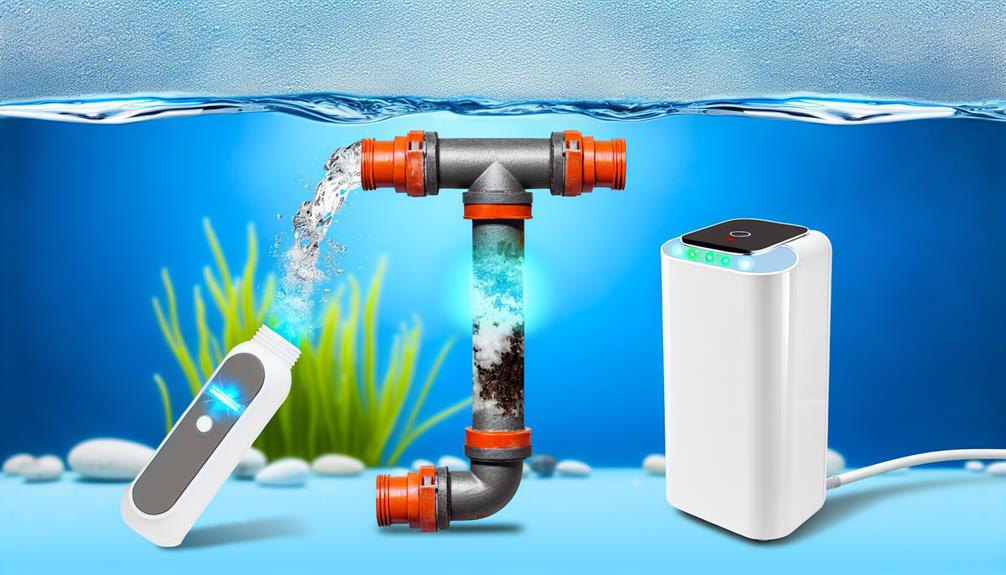
Magnetic and electronic descalers offer an innovative solution for homeowners plagued by the nuisance of hard water, employing magnetic fields or electronic waves to alter the chemical structure of water minerals and prevent scale buildup. These systems are a leap forward in pipe protection and scale prevention, ensuring that your home's plumbing remains free from the detrimental effects of mineral deposits.
| Descaler Type | Mechanism of Action |
|---|---|
| Magnetic Descaler | Uses magnetic fields to change mineral ion charges |
| Electronic Descaler | Emits electronic waves disrupting mineral formation |
The magnetic descaler's primary role is to magnetize water minerals, which inhibits their ability to crystallize and cling to surfaces. This action is critical in safeguarding your pipes from the harsh accumulation of scale. Similarly, electronic descalers emit frequencies that disturb the ionic properties of minerals, rendering them unable to form scale. Both types offer a non-intrusive, maintenance-free approach to tackling hard water issues.
You should note that the efficacy of these descalers can depend on the hardness level of your water and the specific technology used. It's imperative to analyze your situation thoroughly and choose a product with a proven track record in scale prevention and pipe protection. As these solutions do not remove minerals but rather change their properties, water retains its mineral content, which can be beneficial for health.
Conclusion
In conclusion, you've got several options for tackling hard water.
Salt-based systems are highly effective but require maintenance.
Salt-free conditioners offer an eco-friendly choice without the need for salt or chemicals.
Reverse osmosis delivers pure water, albeit with a complex installation.
Magnetic and electronic descalers provide an innovative, non-invasive solution.
Weigh each system's benefits against your specific needs to ensure you select the top water filter for your hard water challenges.
Choose wisely for long-term results and efficiency.
